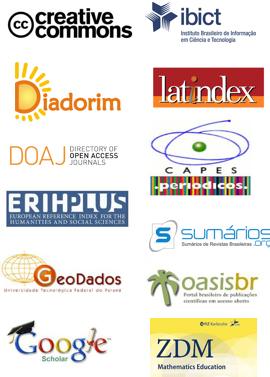Theory of Didactical Situations: Theoretical Rereading from the Perspective of Inclusive Playful Mathematics Education
DOI:
https://doi.org/10.17921/2176-5634.2022v15n2p107-115Resumo
Abstract
This article explains a rereading of the theory of didactical situations (TDS) from the perspectives of playfulness and inclusive education of students with specific educational needs (SEN) in the teaching and learning processes of mathematics. To do so, a theoretical discussion on TDS, playfulness, and inclusive education was held to create a reflection on the possible articulations to be established among them. Notably, TDS was developed by Guy Brousseau (1986) and initially conceives the didactical situation around three poles: teacher, student, and knowledge. Additionally, the teacher and students are considered players who play with the content knowledge to be institutionalized. This aspect allows articulation between TDS and playfulness. In the context of didactical situations, there also exists real or fictional construction of a milieu, wherein the student acts autonomously to build knowledge. Considering this and the inclusion process, the teacher can organize a milieu, considering accessibility in education, to work with every student’s specificities, thus breaking the homogeneity present in educational spaces. Therefore, basing mathematics classes on a theory that makes up the universe of mathematics didactics and was not conceived as playfulness and inclusive perspective but that from the assumption of accessibility, can contribute to the inclusion of all students, regardless of the SEN they may present. The teacher will promote the development of autonomy and critical training of students, in addition to institutionalizing content knowledge and providing the status of knowledge.
Keywords: Mathematics Education. Mathematics Didactics. Playfulness. Inclusive Education. Specific Educational Needs. Accessibility.
Resumo
Neste artigo, temos por objetivo explicitar uma releitura da Teoria das Situações Didáticas (TSD) sob a perspectiva lúdica e inclusiva de estudantes com Necessidades Educacionais Específicas (NEE) nos processos de ensino e aprendizagem da Matemática. Para isto, realizamos uma discussão teórica sobre: TSD, Ludicidade e Educação Inclusiva, que possibilitou refletir sobre as articulações possíveis de serem estabelecidas entre elas. Vale ressaltar que a TSD foi desenvolvida por Guy Brousseau (1986) e concebe inicialmente, a situação didática em torno de três polos, isto é, o professor, o estudante e o saber. Sendo que o professor e os estudantes são considerados jogadores que brincam com o conhecimento a ser institucionalizado. Esse aspecto permite uma articulação da TSD com a Ludicidade. No âmbito da situação didática há ainda a construção real ou ficcional de um milieu, no qual o estudante atua de maneira autônoma, com o intuito de construir o saber. Neste contexto, ressaltamos que perante o processo de inclusão, o professor pode organizar um milieu, considerando à acessibilidade na educação, para com isto, atender a todos os seus estudantes, a luz das especificidades de cada um deles, rompendo-se assim, com a lógica dos espaços educacionais homogeneizantes. Destarte, ao fundamentar as aulas de Matemática em uma teoria que compõe o universo da Didática da Matemática e que a princípio não foi pensada em uma perspectiva lúdica e inclusiva, mas que a partir do pressuposto da acessibilidade pode vir a contribuir com a inclusão de todos os estudantes, independente da NEE que este possa vir a ter, o professor estará propiciando o desenvolvimento da autonomia e da formação crítica dos estudantes, além de estar institucionalizando conhecimentos e conferindo-lhes o status de saber.
Palavras-chave: Educação Matemática. Didática da Matemática. Ludicidade. Educação Inclusiva. Necessidades Educacionais Específicas. Acessibilidade


